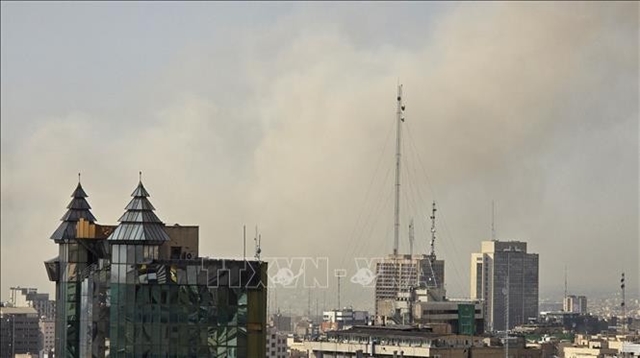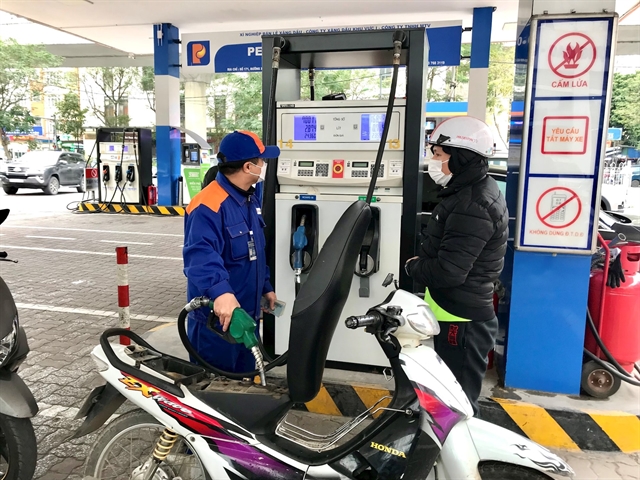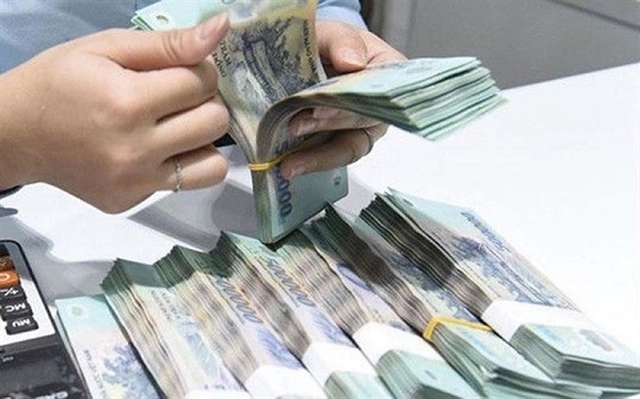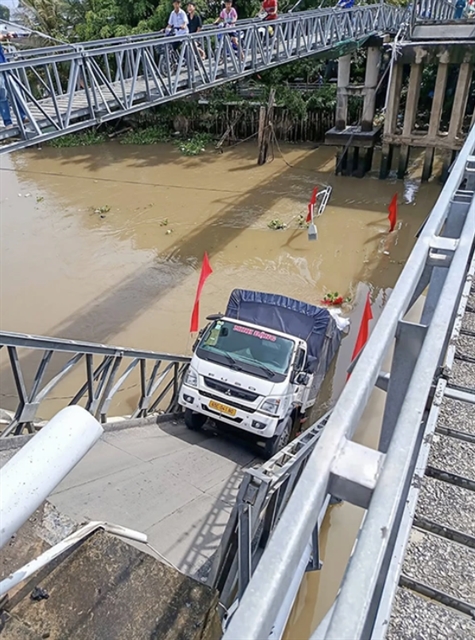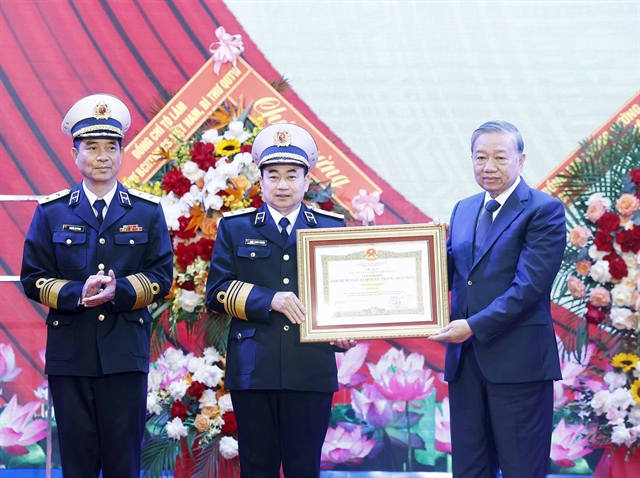 Politics & Law
Politics & Law

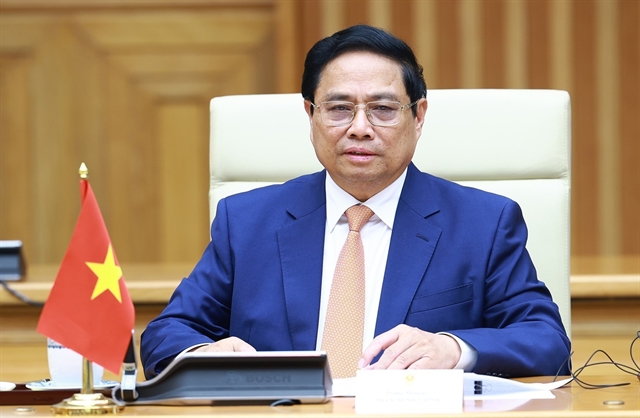 |
| Prime Minister Phạm Minh Chính. — VNA/VNS Photo |
HÀ NỘI — Prime Minister Phạm Minh Chính has penned an article titled 'Government under Party’s leadership: 80-year journey for the nation, for the people' on the occasion of the Government's 80th founding anniversary.
Việt Nam is honoured to introduce a translation of the article:
THE GOVERNMENT UNDER THE PARTY'S LEADERSHIP: 80-YEAR JOURNEY FOR THE NATION, FOR THE PEOPLE
Over the glorious 80-year history of the nation, under the leadership of the Party and revered President Hồ Chí Minh, the Government over different periods has stood shoulder to shoulder with the entire political system, the people, and soldiers to overcome every hardship, leveraging the strength of national unity in tandem with the power of the era, achieving magnificent victories, successfully implementing the cause of resistance and nation-building, attaining independence, freedom, and the happiness for the people, and steering the country decisively on the path of renewal, integration, and development.
Looking back on the 80 years of the Government through periods fraught with hardship and challenges, yet also marked by great glory, honour, and pride in the Vietnamese Revolution, under the leadership of the Party Central Committee, President Hồ Chí Minh, and the consistent direct guidance of the Politburo, the Secretariat, and successive General Secretaries, from the Provisional Government of the Democratic Republic of Việt Nam in 1945 to the Government of the Socialist Republic of Việt Nam today, we have remained united and steadfast, with 'One mind top to bottom,' and 'Smooth sailing across length and breadth,' while tirelessly striving and preserving, all for the goal of 'national independence linked with socialism' and the free, prosperous, and happy lives of the people, contributing to making turning points with 'game-changing' significance and momentous victories, great achievements of historic significance for our nation.
Following the success of the August Revolution, on August 28, 1945, the Provisional Government of the Democratic Republic of Việt Nam announced its establishment to the nation and the world, unveiling a unified national cabinet of 15 members with President Hồ Chí Minh as Chairman. On September 2, 1945, President Hồ Chí Minh, on behalf of the Provisional Government, delivered the Declaration of Independence, proclaiming the birth of the Democratic Republic of Việt Nam, ending over a millennium of feudal rule and nearly a century of colonial and fascist domination, ushering in a new era – that of independence and freedom for the people and country.
In those early days of the nascent revolutionary government, where the situation was as precarious as 'life hanging by a thread,' under the Party’s and President Hồ Chí Minh’s leadership, the Provisional Government simultaneously organised, built and consolidated revolutionary administration, while defending both 'domestic and foreign threats'; built and reinforced national capacity, launching movements to 'Eradicate the enemy of famine' with the 'Rice jars for famine relief' movement, to 'Eradicate the enemy of illiteracy' via 'Education for all' movement, and the 'Golden Week' campaign; organised the general election of the National Assembly on January 6, 1946. On March 2, 1946, the 1st-tenure National Assembly’s first session formed the Resistance Coalition Government with 14 members, and on November 9, 1946, during the second session, it adopted the first Constitution of our country.
Faced with renewed attempts by colonial France to seize our country, President Hồ Chí Minh issued a call for nationwide resistance on the night of December 19, 1946, expressing readiness to sacrifice and resolute determination to defend the nation’s independence and freedom. Under Party leadership, the Government, along with people and soldiers nationwide, engaged in the 'all people’s resistance, all-front struggle', stabilising civilian life while strengthening the armed forces, culminating in key victories during the Việt Bắc Campaign of Autumn–Winter 1947, the Border Campaign of Autumn–Winter 1950, the Winter–Spring Campaign in 1953–1954, and ultimately led to the historic 'Điện Biên Phủ Victory' that 'resounded across the five continents and shook the globe' on May 7, 1954, forcing France to the Geneva Conference, with our delegation led by Deputy Prime Minister and Foreign Minister Pham Van Dong to negotiate an end to war and restoration of peace in Indochina.
Seeking to undermine the Geneva Accords, the French colonials, and later the American imperialists, divided our nation and established a puppet regime in the South. Under Party and President Hồ Chí Minh’s leadership, the Government focused on directing the mobilisation of strength from the whole nation in combination with the power of the era to implement simultaneously dual strategic tasks of constructing socialism in the North and fighting for liberation of the South and national reunification. The North became a 'major rear base,' supporting the beloved South as the 'great frontline.' Widespread movements were launched such as the 'Ba Sẵn Sàng' (three readinesses), 'Ba Đảm Đang (three responsibilities), 'Gió Đại Phong' (great wind), 'Trống Bắc Lý (Bắc Lý drums), 'Sóng Duyên Hải' (coastal waves), and 'Cờ Ba Nhất' (Ba Nhất flag).
By leveraging the 'trident' of political, military, and diplomatic power, we achieved heroic victories in the 1968 Mậu Thân General Offensive and Uprising, the 1972 'Điện Biên Phủ in the Air', and above all the 1975 Spring General Offensive and Uprising, culminating in the ultimate victory on April 30, 1975, liberating the South and reunifying the nation after more than two decades of division. Under Politburo direction, the Government negotiated and signed the Paris Agreement in 1973, aiming to end the war and bring peace to Việt Nam and Indochina.
After the country was reunified, the first session of the 6th National Assembly (1976) decided to name the country the Socialist Republic of Việt Nam. Under the leadership of the Party, the Government (known as the Council of Ministers from July 1981 to September 1992) focused on directing efforts to build and develop the economy, address war consequences, restore production and business activities, continue to protect the borders, and fulfill the noble international duty of assisting the Cambodian people in escaping from the genocidal regime.
In the face of economic stagnation caused by a centralised, bureaucratic, and subsidised management model, which left people struggling with difficulties, the Party and State initiated a shift in economic management mindset with Directive 100, dated January 13, 1981, of the Party Central Committee’s Secretariat, the 'Khoán 10' policy for agriculture under the Politburo’s Resolution 10, dated April 5, 1988, and the 'three plans' for industry and trade under the Government Council's Decision 25/CP on January 21, 1981, on a number of policies and measures aimed at promoting the proactive production and business activities and the financial autonomy of state-owned enterprises (SOEs).
From a country suffering from food shortages, Việt Nam achieved food self-sufficiency, began exporting rice after just one year of implementing the 'Khoán 10' policy, and becomes one of the world's leading rice exporters today. These early results of the renewal process contributed to changing the country’s socio-economic landscape, helping Việt Nam escape poverty, and gradually forming and reinforcing practical arguments for the development of a socialist-oriented market economy.
The 6th National Party Congress (December 1986) ushered in a new era – the era of innovation, integration, and development of the country. Under the leadership of the Party, and the accompaniment of the National Assembly, the Council of Ministers (the Government since October 1992) proactively and decisively instructed all levels, sectors, and localities to implement the economic renewal cause with three key pillars: eliminating bureaucratic subsidisation, developing a multi-sector economy with diverse ownership, and opening door to and integrating into the outside world.
The focus was on comprehensive renewal across all fields, from institution and law making to socio-economic development, environmental protection, social welfare assurance, poverty reduction, improvement of the people's living conditions, consolidation and strengthening of national defence and security, and promotion of foreign relations and international integration.
Việt Nam, once an economy dependent on aid, isolated, and under embargo, has transformed into an open, dynamic economy, classified among the high-growth countries in the region and the world. It is now among the top 15 countries attracting foreign investment and the top 20 largest economies in terms of trade globally. In particular, the country has mobilised resources and effectively implemented policies to ensure social welfare, social benefits, and sustainable poverty reduction, and continually improve the material and spiritual well-being of the people. Việt Nam is regarded as a successful model in achieving the Millennium Development Goals (MDGs), having met the goal of poverty reduction 10 years ahead of schedule.
Building on the heroic traditions of the People's Army and the People's Public Security Force throughout the history of Việt Nam’s Revolution, under the leadership of the Party and with the support of the National Assembly, the Government has focused on directing and prioritising resources to consolidate and strengthen national defence and security capabilities; build a solid all-people defence posture, people-based security posture, and firm people’s heart posture; strongly develop dual-purpose defence and security industries; and strengthen crime prevention measures to maintain a peaceful and stable life for the people.
External relations and international integration have been expanded comprehensively and extensively, inheriting and promoting the nation's diplomatic tradition of peaceful coexistence, as well as President Hồ Chí Minh's diplomatic style of 'utilising the invariables in response to the variables.' This approach harmonises independence, self-reliance and consistency in terms of strategy with flexibility in tactics, placing national interests above all else.
Việt Nam’s foreign relations landscape has continuously expanded. The country joined the United Nations in 1977, ASEAN in 1995, signed the Việt Nam-US Trade Agreement in 2000, and has to date signed and participated in 17 Free Trade Agreements (FTAs).
It now has diplomatic relations with nearly 200 countries and has established comprehensive partnerships, strategic partnerships, or comprehensive strategic partnerships with 38 nations, including all five permanent members of the UN Security Council. This has elevated Việt Nam’s position on the global stage, making the country’s current power, potential, international standing and reputation unprecedented in its history.
Việt Nam has continuously and actively contributed to addressing regional and global issues. Both the army and the public security force have participated in UN peacekeeping missions, earning international recognition and high praises from the international community.
To achieve the two strategic centennial goals as outlined in the 13th National Party Congress’s Resolution, the Party has clearly defined the policy of focusing on building a foundation and vision, and creating development breakthroughs in a new era - the era of the nation’s rise, strong development, civilisation, and prosperity for the nation. Under the direct leadership of the Party Central Committee, its Politburo and Secretariat, headed by Party General Secretary To Lam, and the close coordination of the National Assembly, the Việt Nam Fatherland Front, and socio-political organisations, the Government is concentrating on directing and translating Party policies into specific programmes, plans, tasks, and solutions across all sectors.
First and foremost, with the involvement of the entire political system, the Government has focused on decisively directing ministries, sectors, and localities to carry out a revolution in the organisation of the apparatus, and 'rearranging administrtive boundaries' with the spirit of streamlining the central apparatus, merging provincial and commune administrative units, ending the historical mission of the district level, and organising a two-tier local administration model. After the restructuring and streamlining, the Government for the 2021-2026 term consists of 14 ministries, three ministerial-level agencies, and five government agencies. The local administration operates at two levels with 34 provinces and cities and 3,321 communes, wards, and special zones. At the same time, the transition from a management-based administrative system to a facilitating, service-oriented administration has been initiated. The system has begun to operate smoothly, helping handle administrative procedures more quickly and conveniently, and save time and reduce travel costs for the people and businesses.
The Government has continued to promote and develop the three pillars – a socialist democracy, a socialist rule-of-law state, and a socialist-oriented market economy under the Party’s leadership, the State’s management, and the people’s supervision.
Efforts have been made to implement the consistent viewpoint of taking people as the centre, the subject, the goal, the resources and the most important motivation for development; not sacrifice social progress, equity, welfare, or the environment for mere economic growth.
Focus has been placed on drastically, synchronously and effectively implementing the Party's major viewpoints and policies: (1) Economic and social development and environmental protection are the centre; (2) Party building is the 'key', in which personnel work is the 'key' of the 'keys'; (3) Developing culture as a spiritual foundation of society; (4) Strengthening national defence and security and promoting foreign affairs and international integration are essential and regular; (5) Continuing to promote the fight against corruption, wastefulness, and other negative phenomena; (6) Focusing on ensuring social security, creating all opportunities for equal access to education, health care, culture and sports, and improving the spiritual and material life of the people, and 'leaving no one behind'.
To date, Việt Nam has successfully achieved the 13th Party Central Committee’s target of removing temporary and dilapidated housing nationwide ahead of schedule by five years and four months, with a total of 334,234 houses.
The Government has worked to advance the three strategic breakthroughs, establish a new growth model, restructure the economy, and accelerate industrialisation and modernisation, and develop new productive forces. The Government has implemented decisively the Politburo’s policies in key areas, followed the principle: 'resources come from vision and mindset; momentum comes from innovation and creativity; and strength comes from the people and enterprises,' focused on directing the drastic implementation of breakthroughs in developing socio-economic infrastructure system; and accelerated the construction of key infrastructure projects of highways, airports, seaports, digital infrastructure, education, health care, and culture. Key projects include the Lào Cai – Hà Nội – Hải Phòng high-speed railway, preparations for the North–South high-speed railway, urban railways in Hanoi and Hồ Chí Minh City, and Ninh Thuận 1 and 2 nuclear power plants. Developing strategic infrastructure has been a highlight in recent years, contributing to giving facelift to the country and opening new development opportunities. The Government aims to exceed the targets of 3,000km of expressways and 1,000km of coastal roads this year.
Over the glorious 80-year history, despite many difficult and challenging periods, under the wise leadership of the Communist Party of Việt Nam, the Government has consistently demonstrated strong determination, great efforts, and decisive actions, achieving great accomplishments of historical significance across all sectors. From the Government’s experience, several key lessons can be drawn: (1) Upholding the banner of national independence and socialism; the Government must regard this as a prerequisite and guiding principle in all activities. (2) Putting the people at the centre; the revolutionary cause belongs to, is led by, and serves the people, with citizens and businesses as the core actors in all activities of the Government. (3) Continuously strengthening solidarity within the Party, among the people, across the nation, and international solidarity; the Government must create all conditions to promote and harness the power of national great solidarity; (4) Combining the national strength with the strength of the era, the domestic power with international influence; the Government must be central in integrating these forces while maintaining independence and self-reliance. (5) The Party’s sound leadership is the foremost factor determining the success of the Vietnamese revolution; therefore, all activities of the Government must always operate under the direct and comprehensive leadership of the Party, especially the Politburo and Secretariat, led by the Party General Secretary.
Our country is entering a new development phase amid a mix of opportunities and challenges, with the latter being more prominent. Global and regional situations are forecast to remain volatile, complex, and unpredictable; strategic competition among major powers and conflicts continue in many regions; global economic growth, trade, and investment are slowing, with rising risks. Meanwhile, population aging, resource depletion, environmental pollution, pandemics, natural disasters, climate change, information security, and cybersecurity issues are increasingly complex, exerting growing impacts on all nations and regions.
Under the leadership of the Party, with the active involvement of the political system, the participation and support of the people and the business community, and building on its achievements and valuable experience obtained over the past 80 years, the Government will continue to promote solidarity, act more decisively and effectively, and pursue proactive and innovative approaches, aiming to fulfill its missions and responsibilities to the fullest, together with the country entering a new era - the era of wealth, civilisation, and prosperity, standing shoulder to shoulder with world powers.
The Government will focus on building a 'government of development facilitation, transparency, drastic action, and serving the People'. The Government will resolutely implement the revolution in organisational apparatus; rearrange administrative units at all levels and deploy the operation of the two-level local administration model, changing the state from 'running while lining up' to 'straight lines, clear paths, unanimously moving forward'. We will also promote streamlining the apparatus, improve the effectiveness and efficiency of state management and social governance. The decentralisation and delegation of authority must be speed up with the spirit of 'locality decides, locality implements, locality takes responsibility'.
The Government will promote strategic breakthroughs practically and effectively; continue to perfect development institutions in the direction of liberating productive forces, effectively mobilising all resources, and arousing and creating new driving forces for development. Việt Nam will focus on training and developing high-quality human resources in line with market demand; pay special attention to attracting, promoting, nurturing and developing talents according to Hồ Chí Minh's thought on 'finding talented and virtuous people'. It is necessary to continue to unlock, mobilise and effectively use resources, creating stronger breakthroughs in the development of a synchronous and modern socio-economic infrastructure system, creating a premise for the nation to rise up and take off in a new era of development.
The Government will strongly boost economic growth associated with economic restructuring and establish a new growth model based on science, technology, innovation, digital transformation and high-quality human resources; accelerate industrialisation and modernisation of the economy on the basis of maintaining macroeconomic stability, controlling inflation, and ensuring major economic balances.
It will make the highest efforts and determination, devise specific plans and solutions to achieve the GDP growth target of over 8% in 2025, creating momentum, forces, spirit and confidence to strive for an average growth of 10 per cent or more in the next period.
The Government will focus on drastically and effectively implementing important policies on breakthroughs in science and technology development, innovation and national digital transformation; international integration in the new situation; law making and enforcement; private economic development; state economic development; education and training; people's health care and culture. The spirit is that, immediately after the Politburo issues Resolutions, the Government will submit to the National Assembly for approval of Resolutions on specific and outstanding mechanisms and policies, and the Government will immediately issue specific action plans and focus on drastic and effective implementation.
The Government will synchronously implement solutions for comprehensive development of Vietnamese culture and people with focus on building and developing a Vietnamese culture that is 'national, scientific, popular', advanced, and imbued with national identity. It will pay due attention to ensuring social welfare, security, order, and safety, ensuring social progress and justice, and the material and spiritual life of the people, 'leaving no one behind'. The Government will concentrate on improving the quality of education and training at all levels; innovate and perfect mechanisms and policies on population development; build a fair, high-quality, effective, and sustainable health system.
The Government will strengthen management and efficient use of resources, environmental protection, and proactive adaptation to climate change; promote green transition; effectively implement programmes to prevent and control natural disasters, and respond to climate change in the Mekong Delta; deploy a programme to prevent floods and landslides in the midlands and mountainous areas; and fundamentally overcome the serious environmental pollution in large cities.
The Government will continue to consolidate and enhance national defence and security potential; and firmly protect the Fatherland's independence, sovereignty and territorial integrity. It will build revolutionary, disciplined, elite and modern People's Army and People's Police forces. A focus will be placed on preventing and combating all types of crimes, especially drug crimes, cyber crimes and high-tech crimes. It will consistently implement a foreign policy of independence, self-reliance, peace, friendship, cooperation and development, multilateralisation and diversification of foreign relations; being a good friend, a reliable partner and a responsible member of the international community. The Government will focus on doing well the Party's foreign affairs, the State diplomacy and people-to-people diplomacy; and pay attention to raising the level of foreign relations in the new era, to make it commensurate with the historical, cultural stature and position of the country.
Other tasks are to make the Government Party Committee, and all-level Party Committees of ministries, sectors and localities to be truly clean and strong; build a contingent of cadres and Party members, especially heads of agencies, with sufficient capacity to meet requirements of their tasks; promote the study and following of Hồ Chí Minh's thought, morality and lifestyle and fulfill the responsibility of setting an example for cadres and Party members; resolutely fight corruption, waste and negative phenomena in the state administrative system and the whole society in accordance with the direction of the Central Steering Committee for Corruption, Negative Phenomena and Wastefulness Prevention and Control.
Eighty years of the Government - a journey, a goal with the spirit of solidarity, humanity, will, mettle, confidence and aspiration; knowing how to value time and promote intelligence and decisiveness at the right time. We firmly believe that, under the leadership of the glorious Communist Party of Việt Nam, the companionship and supervision of the National Assembly, the support of the Việt Nam Fatherland Front, socio-political organisations, with the spirit of 'The Government is the servant of the people', 'Whatever is beneficial to the people must be done with all our might. Whatever is harmful to the people must be avoided with all our might', the Government, administrations at all levels, sectors, localities, together with the people and soldiers nationwide will continue to promote the spirit of solidarity, join hands and strive to successfully implement the set strategic goals, firmly bringing the country into the new era, standing shoulder to shoulder with the world powers, as beloved President Hồ Chí Minh had always wished. — VNS

